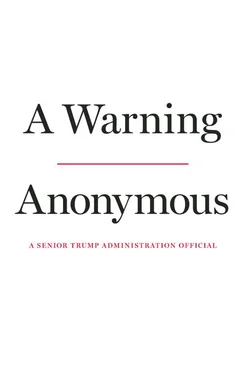It was getting ugly. As the old saying goes, this was no way to run a railroad. In fact, if railroads were run this way, trains would go in the wrong direction, or never show up at all, or crash into each other. The conductor would be unqualified, the engineer would be fired in the middle of a trip, and Chinese-built trains would zip right by us, watching the disaster with wonder at their unbelievable good fortune.
“Among us friends, let’s be honest,” a prominent presidential advisor once remarked, after the pro-chaos crowd left a White House meeting. The slimmed-down group was comprised of White House officials and cabinet secretaries. “About a third of the things the president wants us to do are flat-out stupid. Another third would be impossible to implement and wouldn’t even solve the problem. And a third of them would be flat-out illegal.” Heads nodded.
That day, the group was gathered to discuss a presidential proposal that fell into the first category. Trump wasn’t halfway through year one, and he wanted to shut down the government because he was unhappy with congressional budget negotiations. He’d been talking about it behind closed doors for weeks. Now he was bringing it up in press conferences and tweeted that the government needed a “good shutdown.” The president certainly had the constitutional right to do it. He could veto whatever spending bill was sent to his desk. But it was bound to be a political loser. Federal employees would be without pay, essential services would abruptly halt, and in the end we knew the Democrats were prepared to dig in harder. Picking this fight, advisors warned, could cost the party congressional seats in next year’s midterm election.
We tipped off Republican leaders in Congress that they needed to take it seriously. The president wasn’t just playing a game. “He’s crazy as a lunatic,” one West Wing advisor told the Speaker’s office. Paul Ryan’s team was exasperated and urged us to just “take the win” because they’d already gotten concessions from the Democrats in budget talks. Staff arranged for Trump to hear from Republican members of Congress. They warned him that he would be putting the party’s majority in jeopardy if he caused a shutdown at the end of the fiscal year. They helped persuade him that we would lose the fight and that it wasn’t worth it. The president reluctantly agreed and stood down.
For now, the Steady State had put out the fire, a duty that became an all-consuming function despite the day jobs we’d been hired for. But of course President Trump would revisit the idea of a government shutdown later on, seeking a different outcome.
In the second category—things that the president asks for that “would be impossible to implement and wouldn’t even solve the problem”—we found ourselves tamping down requests from the impractical to the disturbing.
Take February 2018, for instance, when the president proposed a way to end gun violence in our schools. He suggested to aides that weapons be given to all of America’s teachers so they could fight back against mass shooters. This was typical Trump. An idea was formed in the ether of his mind, and he decided it was brilliant because he thought of it. Most sane folks raised an eyebrow. The teachers we remembered tended to be gentler souls like Betty White, not Annie Oakley. We wanted to hand Betty and all of her colleagues a pistol? When this idea seemed unpalatable to us, he ratcheted it back to 20 percent of educators—a figure that seems to have just popped into his head. With 3.7 million teachers in the United States, that would still mean training or putting guns in the hands of nearly a million of them. As Steady Staters tried to explain, this would be wildly impractical and would undoubtedly make the gun violence situation more contentious.
The president took the idea public anyway. “So let’s say you had 20 percent of your teaching force, because that’s pretty much the number,” Trump said, describing the plan. “If you had a teacher who was adept at firearms, they could very well end the attack very quickly.” It was time for all of us to reenact the daily face-palm ritual. It wasn’t that everyone thought having armed and trained officials in schools was bad, it’s just that the president had no conception of what was doable and what was nuts.
One Harvard gun violence expert summed up the public reaction: “It’s a crazy proposal. So what should we do about reducing airline hijacking? Give all the passengers guns as they walk on?”
Fortunately, the idea was dropped because no one else took it seriously, much like the president’s claim that he would be the citizen-hero if he was on the scene of a school massacre. “I really believe I’d run in there, even if I didn’t have a weapon,” he claimed. We couldn’t contain our laughter.
Most concerning are the one-third of “things the president wants us to do [that] would be flat-out illegal.” In fairness, when Trump suggests doing something unlawful, it’s not necessarily nefarious. More often than not, it’s because he doesn’t understand the limits of federal law. He might order an agency to stop spending money on something he dislikes, not knowing he generally can’t cut off funds Congress has already approved. For instance, Trump has repeatedly tried to stop the flow of aid to countries overseas, complaining we are wasting money that should be spent at home. His demands began within weeks of taking office and only got worse when he got briefed about US activities in places such as Africa and Southeast Asia to fight deadly diseases or to invest in activities that are designed to protect US economic interests. “Why the hell are we spending so much money there?” he’d demand, directing officials to stop the programs altogether, which of course they couldn’t do. They’d explain to him that only Congress could make those cuts. He’d say he didn’t care and to do it anyway, but then he’d appear to drop it for the time being. In other cases he thought of the funds as bargaining chips, as in the case of money earmarked by Congress to go to Ukraine, and tried to pause the funds for whatever purpose suited him at the moment, perhaps until he got something he wanted in return.
Or he might tell one of his departments to take an action the law explicitly forbids. This happens a lot with acquisitions. The president inserts himself regularly into discussions about Pentagon purchases, forgetting that the US government isn’t like the private sector, where he can pick a favorite contractor based on personal preferences. He memorably came into office determined to negotiate costs down for the next-generation Air Force One (which he claimed he successfully accomplished, though that’s actually not what happened). To prevent corrupt practices, agreements for the purchase of new aircraft or defense technologies often must be advertised and bid competitively, with strict selection criteria. The president can’t just jump into the fray and pick his favorite company. Once these limitations are explained to him for the umpteenth time, he’ll usually (begrudgingly) relent.
“The president will let me do whatever the hell I want,” a newly minted cabinet secretary remarked after receiving an inappropriate request from Trump. Walking out of the West Wing, he paused and turned around, adding, “That’s why I have to take this job extra seriously.” The president doesn’t police bad behavior in his cabinet, he encourages it. Aides have to self-police.
Other presidential orders cannot be written off to ignorance. This dilemma occurs frequently on the hot-button issue of immigration. The president gets animated on the subject, to say the least, and somehow it’s become a part of all of our lives, even when it’s not in our respective portfolios. Almost anything, any issue, and problem can be tied back to immigration in his mind.
Читать дальше





![Автор неизвестен Детская литература - Верхом на урагане [Из американского фольклора]](/books/25390/avtor-neizvesten-detskaya-literatura-verhom-na-urag-thumb.webp)


